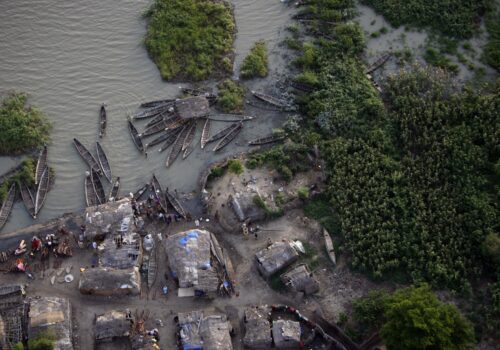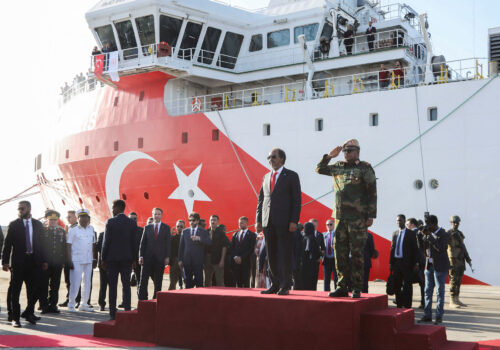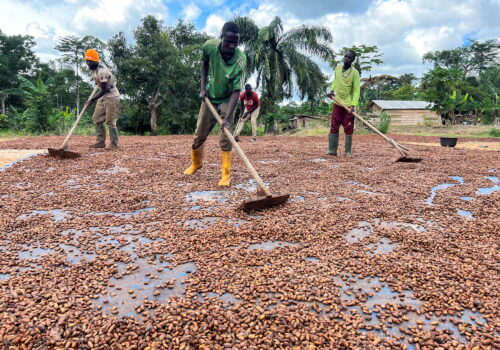This week, the United States urged its citizens to leave Mali immediately, as an al-Qaeda affiliated group imposed a fuel blockade on the capital. More than a routine security warning, this move highlights the deep vulnerability of a country clinging to the illusion of military sovereignty, cut off from its partners, fractured internally, and suffocating in isolation—a stark contrast to Mali’s history and potential.
A coup that promised stability—and delivered chaos
When Colonel Assimi Goïta seized power in back-to-back coups in 2020 and 2021, he vowed the “refoundation” of a sovereign and secure Mali. Instead, the Malian army—trained to fight terrorism—ended up dismantling what was left of the state’s institutional foundations.
Initially expected to strengthen the military, the power grab only deepened its divisions, splitting the army between privileged loyalists of the regime and those sent to the front lines. Coupled with the departure of international forces from Mali, this fragmentation led to abandoned positions, weapons falling into the hands of separatists, and jihadists expanding their hold over the rural north.
Meanwhile, internal purges multiplied and intelligence services—once meant to hunt terrorists—turned inward, redirecting their focus toward political opponents of the regime. The recent imprisonment of former prime ministers Choguel Maïga and Moussa Mara epitomizes a security apparatus more obsessed with loyalty than with counterterrorism.
Bamako’s isolation has deepened
Mali’s internal fragility has been exacerbated by the fact that it has methodically cut itself off from regional and global partners. While its break with France could be framed as a quest for independence and a response to two decades of unsuccessful anti-terrorist operations, Bamako’s estrangement from African allies—particularly the Economic Community of West African States (ECOWAS)—and its withdrawal from the United Nations Multidimensional Integrated Stabilization Mission underscore the junta’s preference for isolation over cooperation.
Even relations with Algeria, which once maintained relatively cordial ties with Mali, have sharply deteriorated. In April, Mali accused its northern neighbor of sponsoring terrorism after the Algerian military shot down a Malian drone. Algiers responded by closing its airspace to Malian aircraft. Meanwhile, Turkey’s recent diplomatic overtures in Algeria suggest that Ankara—which had deepened cooperation with Mali over the past years—might also adjust its policy away from Bamako.
The Russia illusion is fading
The junta’s hope that new alliances could fill this gap has not materialized. Initially optimistic that cooperation with Russia’s paramilitary Wagner Group would help the Malian military suppress jihadist insurgencies, the partnership has instead produced disastrous outcomes. After the Russian mercenaries failed to make meaningful gains, the Kremlin announced in June that it would restructure the paramilitary organization into a new entity called the “Africa Corps,” leaving behind a gaping security and political vacuum.
According to internal reports, Malian soldiers and Russian mercenaries have since repeatedly clashed on the ground, and northern Mali has once again become a contested battlefield. In January 2024, the official abrogation of the 2015 Algiers Accord—a peace agreement with armed insurgent groups—reignited separatist tensions. As a result, the war in the north now stretches almost one thousand miles of front lines across territory the army struggles to control.
Amid this chaos, Mali has become a proxy battleground. Diplomatic sources cite indirect Ukrainian involvement—including intelligence assistance, drone supplies, and support for groups hostile to pro-Russian mercenaries. Meanwhile, Turkey advances its influence by supplying Bayraktar drones and technical support to the Malian army. Mali has essentially become a geopolitical chessboard, where foreign interests and competing local ambitions collide.
The economic asphyxiation of a landlocked nation
Adding to the chaos is Mali’s dependence on supply routes that are increasingly vulnerable. The landlocked country relies heavily on the Dakar-Bamako corridor to import essential goods. Senegal exports nearly 60 percent of its petroleum products to Mali, representing over 20 percent of its foreign trade. Meanwhile, the Casablanca-Nouakchott-Bamako corridor is blocked, as the commune of Diéma in the Kayes region is under siege by armed groups. The Abidjan-Bamako corridor is also disrupted, and even the internal route between Bamako and the city of Ségou in the northeast has come under growing threat, with attacks and kidnappings on the rise.
For weeks, fuel supplies have been interrupted by convoy attacks and restrictions imposed by armed groups, creating endless lines at Bamako gas stations. In a country where transportation, electricity, and logistics depend on diesel, this shortage is tantamount to a national shutdown. For the army, the consequences are severe: Without fuel, armored vehicles are immobilized, convoys are grounded, and northern bases are left exposed.
A fractured and demoralized society
Mali’s diversity has historically been a strength. Between the thirteenth and the fifteenth centuries, the Mali Empire, founded by Soundiata Keïta, was one of West Africa’s largest and most powerful civilizations. Stretching from the Senegal River to Gao and from the Sahara to the Gulf of Guinea, it thrived on multiculturalism and trade among different groups. In the fourteenth century, Mali was essentially a global commercial crossroads, supported by a flexible system that ensured stability across vast and diverse lands while maintaining a tradition of religious tolerance.
Today’s Mali tells a different story. Ethnic tensions in the central and northern regions, amplified by military abuses, have shattered intercommunity trust. The advent of self-defense militias has fractured national cohesion, and entire villages now refuse to cooperate with the armed forces. The demoralized population oscillates between fear and resignation.
Paths to reconstruction
The US evacuation call could foreshadow Mali’s imminent collapse. Yet, an end to the junta’s reign would not be cause for triumphalism, as Malians’ legitimate desire for sovereignty would persist.
For the time being, the urgent task is to mend the national fabric, restore constitutional order within a renewed governance framework, and rebuild alliances. To that end, the army must return to its primary role: defending the homeland, not governing it.
Counterinsurgency presents the most daunting challenge in this regard. France spent almost a decade on the ground, and while it had some early success, it abandoned its counterinsurgency effort.
While intelligence and counterinsurgency will be important going forward, it will be important not to repeat the mistakes of the past. Given the country’s fragmented state, dialogue with jihadists may be unavoidable. Still, their Wahhabi-inspired ideology remains marginal in Mali—and excessive concessions could spark conflict. Is there a potential institutional framework that reconciles demands for Islamization with maintaining a federal republic?
Addressing geographic challenges through deep decentralization or pragmatic federalism could restore power and responsibility to Mali’s regions. Engagement with the Atlantic—via Morocco’s proposals to enable access to the ocean for Sahel countries and Senegal’s historical cooperation—remains critical. Rebuilding ties with the subregion to jointly combat terrorism and reintegration into ECOWAS, even if it requires reform, is equally urgent.
Finally, Mali will need patriots capable of enlightened leadership—something the immediate predecessors of the junta failed to provide—to chart sustainable economic prospects. Mali’s assets remain vast: It is among Africa’s top gold producers; has untapped reserves of lithium, iron, bauxite, phosphates, manganese, and uranium; and has significant agricultural potential from cotton and livestock. Moreover, Mali maintains a strategic position in West Africa, with strong hydropower and solar potential, and, above all, a large and determined youth population.
All it needs is the right leadership to seize that potential.
Rama Yade is the senior director of the Atlantic Council’s Africa Center.
Hussein Ba is a Senegalese columnist who frequently covers security and political issues in Mali.

The Africa Center works to promote dynamic geopolitical partnerships with African states and to redirect US and European policy priorities toward strengthening security and bolstering economic growth and prosperity on the continent.
Further reading
Tue, Oct 21, 2025
The Lake Chad Basin could power growth instead of conflict
AfricaSource By
Despite vast oil, gas, and mineral wealth, the Lake Chad Basin remains trapped in insecurity. Transforming resources into peace requires transparent governance, community trust, and accountable partnerships that deliver real benefits for citizens across the basin.
Wed, Sep 10, 2025
To counter Chinese and Russian influence in Africa, Turkey could be a decisive ally for the US and Europe
AfricaSource By Rama Yade, Defne Arslan
As Turkey continues to develop closer ties to African nations, the United States and Europe should work with Turkey as a partner in its efforts to gain soft power throughout the continent.
Fri, Aug 15, 2025
Cameroon could bridge the gap in US cocoa and timber imports
AfricaSource By
As cocoa prices surge and timber demand grows, Cameroon stands out as a strategic trade partner. US firms and policymakers have yet to fully seize the opportunity.
Image: FILE PHOTO: People gather at a petrol station due to shortage of petrol in Bamako, Mali October 7, 2025. REUTERS/Idriss Sangare/File Photo



